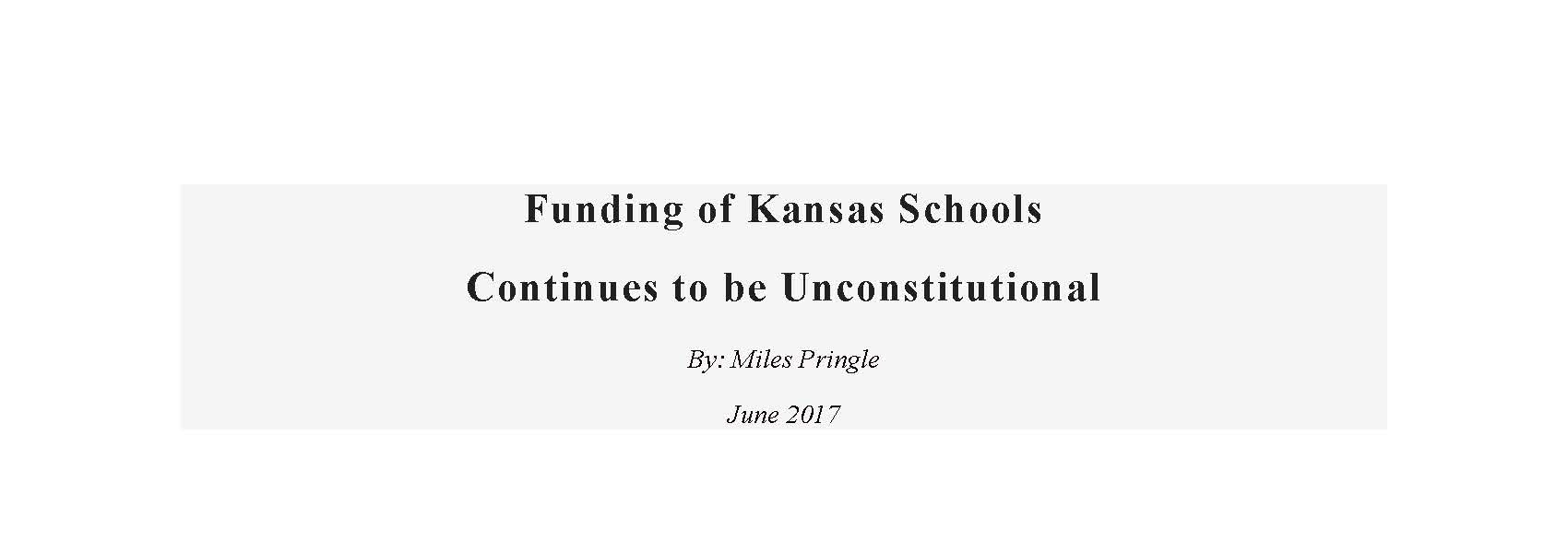Funding of Kansas Schools Continues to be Unconstitutional
By: Miles Pringle
June 2017
On March 2, 2017, the Supreme Court of Kansas again declared the state’s funding levels for grades K-12 in the state to be unconstitutional. You have likely read about this before, as this is part of an on-going legal battle regarding school funding. The opinion affirms that the Kansas Legislature has until June 30, 2017 (after the 2016-17 school year) to comply with the Court’s order.
The Court’s ruling interprets Article 6(b) of the Kansas Constitution which provides in part that the “legislature shall make suitable provision for finance of the educational interests of the state.” The Court described the recent history of Kansas School funding, explaining that in 2006, after a prior Court ruling, the State increased education funding by $466.2 million over a three-year period, and raising base state aid per pupil (“BSAPP”) “for fiscal year 2007 from $4,257 to $4,316; to $4,374 for fiscal year 2008; and up to $4,433 for fiscal year 2009.”[i] However, in 2009-10 the Kansas Legislature began making cuts to education funding so that byfiscal year 2012, “the legislature had reduced BSAPP to $3,780. In total, the reduction to education funding through these BSAPP reductions constituted a loss of more than $511 million to local districts.”[ii]
The Court further noted that when determining whether “the adequacy requirement of Article 6 of the Kansas Constitution is being met, it is appropriate for courts to look at both the public education financing system's inputs, e.g., funding, and outputs, e.g., outcomes such as student achievement.”[iii] Thus, the Court considered specific data placed into evidence. For example, the Court cited the results of several statewide exams, including an exam for Kansas eighth graders given every year which showed the percentage of students scoring "below proficient" and "below basic":[iv]
The Oklahoma Constitution does not have the same language as Kansas’. The Oklahoma Constitution provides in Article XIII, Section 1 that the “Legislature shall establish and maintain a system of free public schools wherein all the children of the State may be educated.” In 2007, the Oklahoma Supreme Court found that it did not have the authority to make a ruling similar to the Kansas Supreme Court, stating “We also are aware of the importance of an educated society to our system of government. However, the important role of education in our society does not allow us to override the constitutional restrictions placed on our judicial authority.”[v]
It should be noted that Oklahoma received an overall grade of “D+” by Education Week, putting it only ahead of only five other states.[vi] Kansas received a “C” grade. Additionally, according to figures cited by Education Week, Kansas had a higher percentage of proficient students in reading and math for grades 4 and 8 (the only grades listed):[vii]
We are all well aware of Oklahoma’s budgetary shortfalls over the past few years and its affects not only on education, but other government functions as well. Many Oklahomans are trying to do their part, including oil and gas producers. For example, On April 3, 2017, the Oklahoma Energy Producers Alliance asked the Legislature to repeal laws which lowered some oil and gas productions tax rates from 7 percent to 2 percent.[viii] Former Tulsa Mayor, Republican Dewey Bartlett, Jr., was quoted as saying “We must face the stark reality that state government is bankrupt. We are staring at a second straight billion-dollar deficit in state funding. Our schools are in a funding crisis.”
[i] Gannon v. State, 2017 Kan. LEXIS 64, at *51-53 (Mar. 2, 2017)
[ii] Id.
[iii] Id, at *4.
[iv] Id, at *106-07.
[v] Okla. Educ. Ass'n v. State ex rel. Okla. Legislature, 2007 OK 30, 158 P.3d 1058.
[vi] Education Week, “Quality Counts 2016: State Report Cards Map”, published December 30, 2016, available at http://www.edweek.org/ew/qc/2016/2016-state-report-cards-map.html (last accessed April 5, 2017).
[vii] Numbers provided by Education Week, “K-12 Achievement”, available at http://www.edweek.org/ew/articles/2016/01/07/2016-education-rankings-put-states-nation-to-the-test.html?intc=EW-QC16-LFTNAV (last accessed April 5, 2017).
[viii] Franklin, Dallas, “Oil, gas producers ask Oklahoma Legislature to increase tax”, AP WIRE, published April 4, 2017, available at http://kfor.com/2017/04/04/oil-gas-producers-ask-oklahoma-legislature-to-increase-tax/ (last accessed April 5, 2017).
©PRINGLE® 2017
This Article was originally published in Oklahoma County Bar Association’s Briefcase Vol. 50 No. 6 in June 2017.


